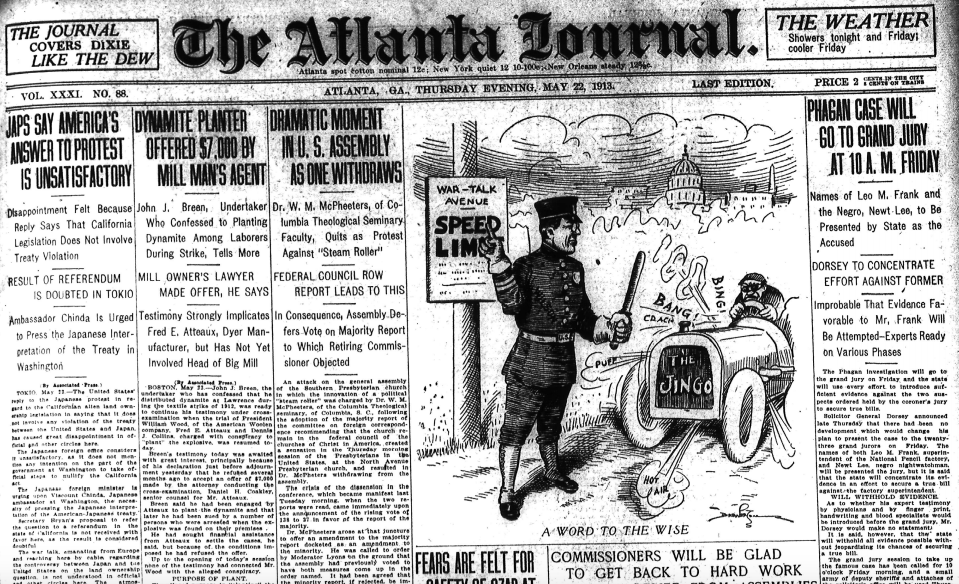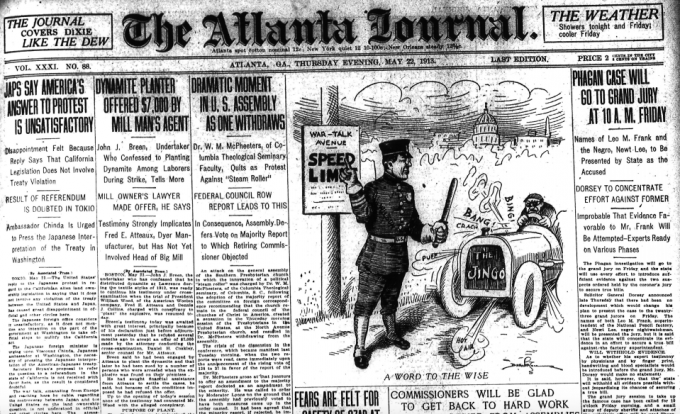Another in our series of new transcriptions of contemporary articles on the Leo Frank case.
Atlanta Journal
Thursday, May 22nd, 1913
Names of Leo M. Frank and the Negro, Newt Lee, to Be Presented by State as the Accused
DORSEY TO CONCENTRATE EFFORT AGAINST FORMER
Improbable That Evidence Favorable to Mr. Frank Will Be Attempted—Experts Ready on Various Phases
The Phagan investigation will go to the grand jury on Friday and the state will use every effort to introduce sufficient evidence against the two suspects ordered held by the coroner’s jury to secure true bills.
Solicitor General Dorsey announced late Thursday that there had been no development which would change his plan to present the case to the twenty-three grand jurors on Friday. The names of both Leo M. Frank, superintendent of the National Pencil factory, and Newt Lee, negro nightwatchman, will be presented the jury, but it is said that the state will concentrate its evidence in an effort to secure a true bill against the factory superintendent.
WILL WITHHOLD EVIDENCE.
As to whether his expert testimony by physicians and by finger print, handwriting and blood specialists would be introduced before the grand jury, Mr. Dorsey would make no statement.
It is said, however, that the state will withhold all evidence possible without jeopardizing its chances of securing a true bill.
The grand jury session to take up the famous case has been called for 10 o’clock Friday morning, and a small army of deputy sheriffs and attaches of the solicitor’s office will be used Thursday in subpenaing [sic] the numerous witnesses in the case.
Considerable of the irrelevant testimony given at the coroner’s inquest will be eliminated at the grand jury hearing, as Solicitor Dorsey is very familiar with the testimony of practically every witness, and only the necessary questions will be asked.
Despite the familiarity of the officials with the case, it is very probable, however, that the hearing will consume both Friday and Saturday and possibly it will be adjourned into next week.
EVIDENCE FOR ACCUSED.
The law on the question of admitting testimony in favor of the defense or accused, should the grand jury desire it, is very hazy, but it is certain that the efforts of any of the jurors or attorneys for Mr. Frank to bring in any evidence except that of the state, will be combated.
The supreme court is quoted as holding that even if the solicitor is willing, no evidence for the defense can be introduced before the grand jury, but the decisions referred to say nothing about the admission of special testimony on the request of the jury.
However, it is considered improbable that any effort will be made to introduce testimony favorable to Mr. Frank, as a grand jury indictment is simply an accusation.
It requires the vote of twelve grand jurors to secure a true bill. A session of the jury is legal if there are as many as eighteen of the twenty-three jurors present.
While it is said that the work of finger print experts is considered of great importance to the state, Solicitor Dorsey is authority for the statement that it has not changed the aspect of the state’s case.
EXPERTS TO TESIFL [sic]
Neither Solicitor General Hugh M. Dorsey nor P. A. Flak, the New York finger print expert, will discuss the result of their work on Wednesday, but it is said to be certain that either Mr. Flak or L. J. Fletcher, finger print experts at the Federal prison, will be one of the witnesses if either of the two men ordered held by the coroner’s jury is brought to trial on a charge of causing Mary Phagan’s death.
Mr. Flak was formerly in the British service in India, and has made a life study of finger print identification methods.
He declares that while here he will try to induce local bankers to adopt his finger print method of identification of depositors, which is now in use in a number of cities in the east. Flak gave some remarkable demonstrations Wednesday of his ability to identify finger prints.
MANY HANDLED THEM.
Friends of the expert say that had he been called into the case at the first he undoubtedly would have been able to eliminate any innocent suspect. Now, however, the notes found by Mary Phagan’s body are so old and have been handled by so many people that it is probably that any marks of the original writer have been eliminated. By sprinkling a certain powdered preparation over a sheet of paper, Flak raises the finger prints, which he readily identifies.
Flak came here at the request of C. Irvine Walker and Austin B. Higdon, of the Southeastern Banker, and probably will remain in the city for several days.
Interesting in connection with Mr. Flak’s work on the case is the statement of C. W. Tobie, the Burns’ investigator, that one of the features of the case which he has informed had been overlooked, was an effort to get the slayer’s finger and shoe prints.
NOTES IN A BANK NOW.
Of so much value are the two notes found by Mary Phagan’s body in the basement of the National Pencil factory considered to the state, that they now are in a safety deposit vault in a local bank, instead of reposing in the solicitor’s office, where “evidence” usually is placed.
Mr. Flak made a number of experiments at the bank with the notes, and later he went to the solicitor’s office, where he “raised” prints of the fingers of Leo M. Frank and Newt Lee, which he is said to have obtained at the tower.
The Burns’ investigator declares that he has found several leads which he hopes will prove of value. But he will make no direct statement about the reported finding of a new and important witness in the case.
COLONEL FELDER PLEASED.
Colonel Thomas B. Felder, who employed the Burns agency to help ferret out the mystery, declares that he is well satisfied with the progress Investigator Tobie has made.
“Of course,” says Mr. Felder, “Mr. Tobie has developed a number of matters of importance, which cannot be made public at this time. I have every confidence in his ability ultimately to solve the mystery.
“My confidence in him has been increased as the result of his few days’ work.”
Relative to the fund which Mr. Felder is raising by public subscription to pay the detectives, he says it is growing slowly.
“We have enough,” he says, “to keep Mr. Tobie on the job for some time, but if he doesn’t secure sufficient evidence to convict by the time William J. Burns returns from Europe, I hope the fund will be sufficiently increased to bring Burns himself here. Burns has never failed in a case where he took charge in person, and if the people want to see little Mary Phagan’s murderer punished, I urge that they send in their subscriptions to the fund.”
* * *
Atlanta Journal, May 22nd 1913, “Phagan Case Will Go to Grand Jury at 10 A. M. Friday,” Leo Frank case newspaper article series (Original PDF)

